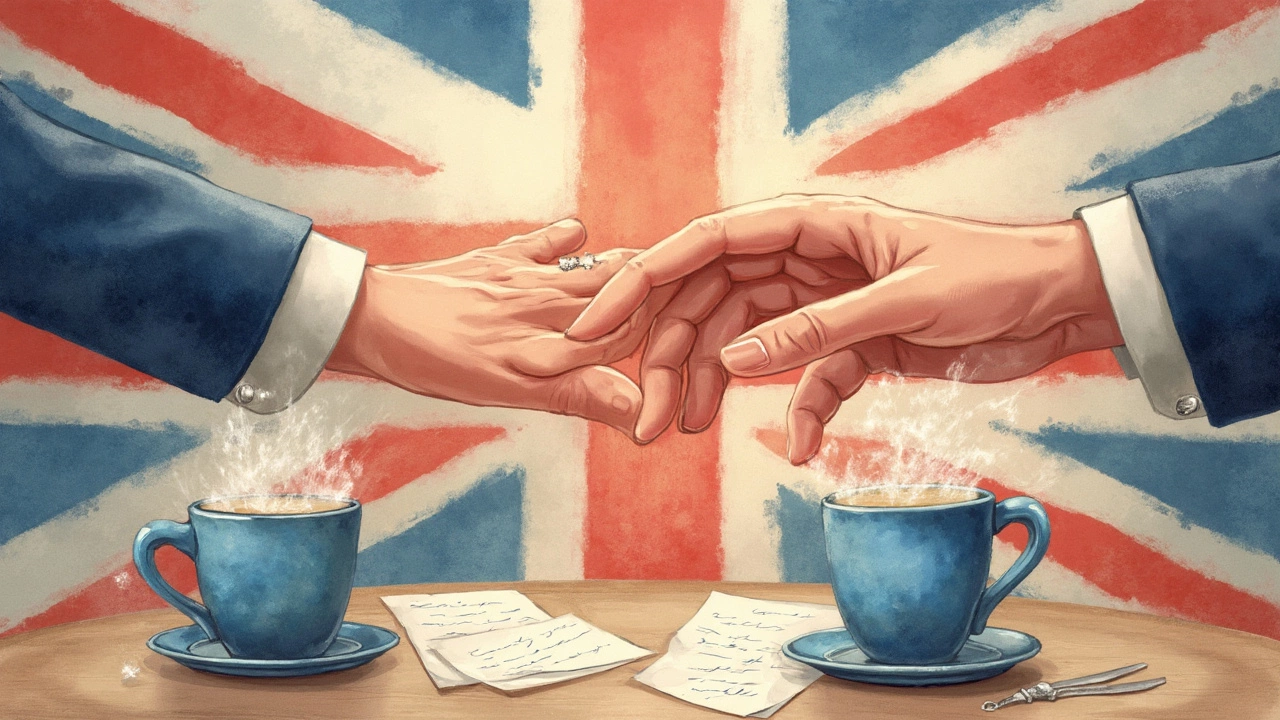If you've ever lost your patience in the middle of a conversation with your partner, you're not the only one. In the UK, over 60% of couples say communication is their main struggle according to a 2024 survey by Relate. It's wild that, despite having voices and thumbs for texting, it sometimes feels impossible to say what we mean—or to hear what the other person is really saying.
Why Communication Gets Messy
It doesn’t matter if you’ve been together a year or a decade—communication can get downright tricky. The problem? Most people think talking is the same as communicating. But real communication is more than words; it's reading between the lines, understanding tone of voice, catching tiny facial twitches, and noticing when your other half barely touches their tea. You can’t just talk and call it a day.
About 93% of communication is nonverbal according to research by Dr. Albert Mehrabian. That means the look on your face and the way you shrug matters more than what you actually say. My wife, Elodie, can spot a white lie from across the kitchen just by watching my eyebrows. It’s not just about honesty—it’s about figuring out how to listen to everything, not just the words.
We all bring our own 'baggage.' Maybe your last relationship ended because no one spoke about real feelings. Maybe, like me, you grew up in a family famous for silent dinners and cryptic remarks. All these past experiences shape how you react. One study from 2023 by the University of Manchester found that 48% of adults avoid serious conversations because of experiences they had in childhood. Those habits stick around, messing with your ability to open up now. The good news? People aren’t doomed to repeat old mistakes.
Another common roadblock is the 'assume and react' trap. Instead of checking in, we guess what our partner thinks and jump straight into defense mode. In my circle here in Bristol, I've seen friends slam doors over something they totally misunderstood. Sound familiar? Simple fixes, like asking "What did you mean by that?" can save you a world of hurt. According to the Gottman Institute, couples who clarify before reacting are 65% more successful at resolving arguments.
Take the topic of digital miscommunication. A 2024 survey found that 72% of couples argue over texts being 'misinterpreted.' Emojis and shorthand save time, but they ignore the whole vibe. That quick "K" text can spiral into a multi-hour fight just because someone skipped the smiley face. In the end, it’s about understanding the tools you use and the personal quirks you bring to each conversation.

Habits That Build Better Communication
Healthy communication isn't magic. It’s a set of deliberate habits you work on, even when it feels awkward. People love to talk about compromise and 'open dialogue.' But what does that actually look like when you’re tired after a long week and your partner keeps leaving socks everywhere?
- Relationship communication starts with listening first. Not the kind where you’re just waiting for your turn to talk. Instead, practice 'active listening.' That means you stop what you’re doing, make eye contact, and really listen. No phones. No TV. According to a Cambridge study in 2022, partners who practiced this once a week reported feeling 30% more understood.
- Empathy is underrated. If Elodie has a tough day and snaps, instead of biting back, I try to imagine her point of view. Couples who show empathy bounce back from fights faster. A simple "That sounds hard, tell me more" goes a long way toward softening a tense moment.
- Be direct but kind. Too many people bury their feelings under sarcasm or silent treatment. When you need to bring up something tough, use "I feel..." instead of "You always..." Blame shuts people down, while sharing feelings invites progress.
- Timeliness matters more than most think. Don’t dump every issue on your partner at 11 pm or right before work. People are much more open to discussion when they're rested and unrushed. Set aside real time—or schedule a walk together, which often leads to better conversations because there’s less pressure making direct eye contact.
- Don’t be afraid to take breaks in heated arguments. If tempers flare, science says a 20-minute time-out lowers the odds of saying something you regret (data: The British Psychological Society, 2023).
- Use "soft start-ups." When raising a touchy subject, start gently instead of storming in. According to Dr. John Gottman, couples who do this are far more likely to reach a solution.
- Check your nonverbal cues. Make sure your body language lines up with your words. Rolling your eyes while saying "I'm listening" isn’t fooling anyone. Partners notice, and it can kill trust faster than an argument.
- Don’t forget small talk. Regular, friendly chats build emotional intimacy. When you share little details about your day, it makes the big conversations less scary down the road.
- Celebrate wins, however small. If you managed an awkward topic well, say it out loud: "Hey, that conversation was tough, but I’m glad we talked about it." It reinforces the habit of healthy communication for next time.
There's no shortage of advice out there, but real progress comes from trying these things week after week, not just when things are tense. Nobody gets this right all the time. Elodie and I have had our fair share of communication disasters. That’s normal. The trick is to keep talking, even when you don’t want to. A 2024 YouGov poll says couples who regularly discuss problems—even small ones—report 40% higher satisfaction. And if you need a more visual comparison, here’s a quick data snapshot:
| Communication Habit | % Couples Who Reported Improvement |
|---|---|
| Active Listening | 73% |
| Empathic Responses | 65% |
| Timely Conversations | 58% |
| Nonverbal Awareness | 62% |
| Small Talk Habits | 49% |
Building these habits isn’t just about preventing arguments. It’s how you create trust. Over time, it becomes easier to share, harder to hide problems, and less scary to admit when you’re wrong.

Dealing with Common Communication Traps
Everyone stumbles on the same handful of communication pitfalls, no matter how close you are. Recognizing these early can make the difference between a quick fix and a recurring mess. Let’s break them down and talk about what actually works when you’re knee-deep in a disagreement.
First up: assumptions. Our brains are wired to fill in the blanks when something feels off. Maybe your partner is quiet tonight. Instead of asking, you jump straight to, "Are they mad at me?" The better move is to check in instead of assuming the worst. Studies from King's College London (2023) show relationships are 45% more likely to last when both partners ask clarifying questions during uncomfortable times.
Another classic trap is the blame game. It’s easy to keep score. Who did what, who forgot what, who left a mess. But focusing on the scoreboard keeps you stuck. Elodie and I have a pact: if we start tracking the other's missteps, one of us calls a 'reset' and we try to talk about solutions, not past failures. You’ve probably heard this called 'solution-focused dialogue.' The trick? Stay in the present and the future, and only dip back into the past if you’re learning from it, not just fighting about it.
There's also the issue of mismatched expectations. Maybe you need time alone after work, while your partner wants to talk right away. Instead of hoping things magically line up, spell out what you each need. I’ll be honest: this one took me years to figure out. It felt awkward to say, “I need half an hour to decompress,” but when I finally did, it made everything smoother at home.
Outside stresses can ruin your flow, too. Jobs, money, family—none of it stays tidily outside your front door. I remember the year both Elodie and I switched jobs. Every discussion felt sharp on the edges, like we were waiting for bad news. It helped to identify what was work stress and what was relationship stuff. Couples who make a habit of naming external pressures in conversations end up having fewer misunderstandings, according to a 2024 Oxford Health study.
Then there’s the classic 'stonewalling,' where one person shuts down and says nothing. Stonewalling pops up in about 15% of serious arguments according to relationship therapists. The silent treatment feels safe, but it usually makes things worse. If you find yourself pulling back, try letting your partner know you just need a short break—and actually come back to the conversation later, so trust doesn’t take a hit.
- When things get tense, repeat what your partner said back to them: "So what you’re saying is…" This helps clarify and shows you care enough to get it right.
- Watch out for loaded words like "always" or "never." They put your partner on the defensive before you even begin.
- If a conversation gets too hot, practice deep breathing together or even share a moment of silence, then return to the issue. It’s cheesy but surprisingly effective.
- Keep arguments focused on one topic at a time. Don’t pile on every complaint from the last year—nobody wins that fight.
- End every difficult talk with something positive, even if it’s as simple as a compliment or a thank you for being willing to talk.
The funny thing? The more you’re aware of these traps, the less likely you’ll fall into them. Just knowing the patterns isn’t enough, though—you actually have to point them out in real time, which takes guts. But when your relationship feels safe enough to call things out, big arguments tend to shrink back down to their real size instead of blowing up overnight.
If you’re dealing with deeper stuff like repeated trust issues or constant misunderstandings, don’t be afraid to loop in outside help. More people than ever—especially since 2023—see relationship counselling as a way to level up, not a sign of disaster. Even one or two sessions can shake up old patterns and teach you to talk in whole new ways.
At the end of the day, keeping communication healthy is about choosing trust over self-protection, honesty over comfort, and practice over perfection. Every relationship has its awkward silences and fiery moments, but working on how you talk to each other creates the kind of partnership that lasts.

